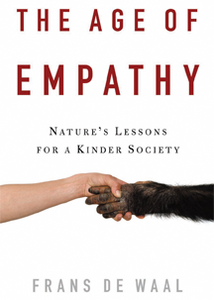Posts tagged "Frans"

The Age of Empathy:
Are We Essentially Good or Evil?
i thought that you would like to read what one of our most important primatologists has to say about empathy among animals and how he believes it is a behaviour that has evolved in mammals. He echoes his earlier hypothesis that we are good (altruistic) by nature and not just kindly mannered on the surface. Many believe, what Frans de Waal calls the 'veneer theory' of human behaviour, that we display an altruistic behaviour on the surface but that we are actually evil in our core. He is convinced that we are innately good. How encouraging to hear this from a biologist and zoologist.
 Kachiko
Kachiko
We took my daughter and her friend to see the recent film by Richard Geere called "Hachiko: a dog's story" based on a real dog that lived in Japan in the 1930s. The film helped us remember, as the Yoga and Buddhist traditions do, that we are part of the same family of creatures called mammals. Today, thanks to Darwin, we call this common heritage, evolution. Nevertheless, we all cried uncontrollably when the dog Kachiko, displayed devotion and attachment that compared to the most touching of human devotion. How can it be that he has such deep attachment to someone not of his speicies? Perhaps we are not so separated from other species as we have been led to believe by our Judeo-Christian tradition!
Animals also Display Empathy
Frans de Waal's latest book "The Age of Empathy" illustrates the mounting evidence for not only the six basic emotions as Darwin proposed but much more - empathy and sympathy; emotion and cognition. Not only do many animals feel empathy but they exhibit behaviours that suggest that they are capable of the cognition of empathy. De Waal 'shows us that many animals are predisposed to take care of one another, come to one another’s aid, and, in some cases, take life-saving action'. Here is an excerpt from his new book which was published in the September 2009 issue of Natural History magazine.
An Excerpt from "The Age of Empathy: Nature’s Lessons for a Kinder Society"
"Apes will groom and hug those in distress. There is also evidence of that behavior in dogs. Belgian biologists watched more than a thousand spontaneous fights among dogs released every day onto a meadow at a pet-food company. After aggressive outbursts, nearby dogs would approach one of the combatants—usually the loser—to lick or nuzzle, play with, or simply sit with him or her. Doing so seemed to settle the group, which quickly resumed its usual activities. "
"
"As for its origins, empathy probably started with the birth of parental care. During 200 million years of mammalian evolution, females sensitive to their offspring out reproduced those that were cold and distant. When a pup, cub, calf, or human baby is cold, hungry, or in danger, its mother needs to react instantaneously. Females that failed to respond did not propagate their genes."
"Descended as we are from a long line of mothers who nursed, fed, cleaned, carried, comforted, and defended their young, we should not be surprised by gender differences in human empathy. Two-year-old girls who witness others in distress treat them with more concern than do boys of the same age. And in adulthood, women report stronger empathic reactions than men, which is one reason why a “tending instinct” has been attributed to women."
Frans de Waal
Frans de Waal is a psychology professor at Emory University with a Ph.D. in biology. He is the author of many books, including Chimpanzee Politics and Our Inner Ape. The director of the Living Links Center at the Yerkes National Primate Research Center in Atlanta, de Waal was ranked among the World’s 100 Most Influential People of 2007 by Time.

